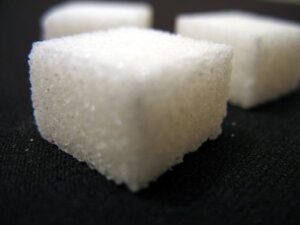Is Sugar More Dangerous Than Tobacco?

The Nutrisweet, hyper-saccharin, high-fructose corn syrup-soaked world is slowly realizing that sugar is in fact bad for us. Really bad.
Added sugars (not the natural sugars found in fruit) like refined sugar and high fructose corn syrup now represent about 17 percent of the total American diet.
Shockingly, the average American drinks 53 gallons of soft drinks per year and overall sugar consumption has tripled in the last 50 years.With many countries struggling to control obesity epidemics, some believe that sugar is so toxic it should be regulated like alcohol and that ultra-addictive substance, tobacco.
Is sugar a public health hazard?
Given sugar’s addictive qualities (the more you consume, the more you need to keep yourself satiated), likening it to tobacco isn’t such a stretch. Acording to a recent report, titled Sugar: Consumption at a Crossroads, the increasing public backlash against sugar is about to make for a real economic impact, affecting sugar producers and food and beverage companies alike. As more and more studies link sugar to obesity and other health issues, the sugar industry is bracing for a decline, similar to that of the tobacco industry.
Companies will have two choices: tank or “self-regulate” by launching drinks with natural sweeteners that have zero or “minimal caloric content.” Who are some of the companies most at risk in this situation? Coca-Cola, Dr. Pepper, Snapple and beyond.
Of course, just like tobacco, studies showing the negative effects of sugar don’t mean people will give it up immediately. Sales of cigarettes have been in decline since the 1970s, when the link between lung cancer and smoking was first publicly made. As public policy followed suit, and states began instituting full or partial bans on public smoking, the rates continued to drop, but there are still plenty of smokers out there.
Will the sugar industry go down the same path? While things are trending in that direction, Stefano Natella of Credit Suisse points out that it’s not quit the same situation. “It’s not quite another tobacco story,” told CNBC. “With tobacco, there was medical research which proved a direct link to lung cancer. In this case, there is a contribution but the problem is that you can never prove causality to diabetes type 2 – you can’t measure how much sugar people are eating.”
As always, it’s a question of economics, and while some people may reduce their sugar consumption for health reasons, the market will continue to find ways to sell their products.
“The potential for a surge in negative public opinion and the looming threat of regulation and taxation are issues that the food and beverage industry clearly must address, though the extent to which they can do so without hurting their current business models is up for question. A diversification into new healthier products is gathering momentum. Change will bring new investment opportunities with clear winners and losers,” said the report.
Related on Organic Authority:
Ban on Sugar Gets European Fruit Juice Industry Approval
Can You Give Up Sugar? New Research Says its Toxic
Sugar’s Triumphant Return (But It’s Still Bad for You)
Image: Uwe Hermann

